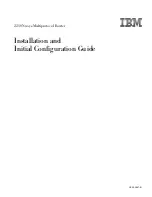
Publication date:March., 2011
Revision A1
49
3-1-5. IPv6 Configuration
Internet Protocol version 6 (IPv6)
is a version of the Internet Protocol (IP) that is
designed to succeed Internet Protocol version 4 (IPv4). The Internet operates by transferring
data in small packets that are independently routed across networks as specified by an
international communications protocol known as the Internet Protocol. Each data packet
contains two numeric addresses that are the packet's origin and destination devices. Since
1981, IPv4 has been the publicly used version of the Internet Protocol, and it is currently the
foundation for most Internet communications. The growth of the Internet has mandated a
need for more addresses than are possible with IPv4. IPv6 allows for vastly more addresses.
Function name:
IPv6 Configuration
Function description:
Configure the switch-managed IPv6 information on this page.
The Configured column is used to view or change the IPv6 configuration.
The Current column is used to show the active IPv6 configuration.
Parameter description:
Auto Configuration
Enable IPv6 auto-configuration by checking this box. If fails, the
configured IPv6 address is zero. The router may delay responding to a
router solicitation for a few seconds, the total time needed to complete
auto-configuration can be significantly longer.
Address
Provide the IPv6 address of this switch. IPv6 address is in 128-bit records
represented as eight fields of up to four hexadecimal digits with a colon
separating each field (:). For example, 'fe80::215:c5ff:fe03:4dc7'. The
symbol '::' is a special syntax that can be used as a shorthand way of
representing multiple 16-bit groups of contiguous zeros; but it can only
appear once. It can also represent a legally valid IPv4 address. For
example, '::192.1.2.34'.
Summary of Contents for 065-7851
Page 1: ......
Page 2: ......
Page 62: ...Publication date Oct 2012 Revision A2 60 Fig 3 12 ...
Page 101: ...Publication date Oct 2012 Revision A2 99 Fig 3 34 ...
Page 104: ...Publication date Oct 2012 Revision A2 102 Fig 3 37 Fig 3 38 Fig 3 39 ...
Page 105: ...Publication date Oct 2012 Revision A2 103 Fig 3 40 Fig 3 41 ...
Page 106: ...Publication date Oct 2012 Revision A2 104 Fig 3 42 ...
Page 121: ...Publication date Oct 2012 Revision A2 119 Fig 3 61 Set up VLAN Tag Priority Mapping ...
Page 122: ...Publication date March 2011 Revision A1 120 Fig 3 62 Set up VLAN Tag Priority Mapping Finish ...
Page 136: ...Publication date Oct 2012 Revision A2 134 Fig 3 69 Frame Type Fig 3 70 ...
Page 137: ...Publication date Oct 2012 Revision A2 135 Fig 3 71 Fig 3 72 Fig 3 73 ARP ...
Page 138: ...Publication date Oct 2012 Revision A2 136 Fig 3 74 ARP Fig 3 75 ARP Fig 3 76 ARP Fig 3 77 ARP ...
Page 139: ...Publication date Oct 2012 Revision A2 137 Fig 3 79 ARP Fig 3 80 ARP Fig 3 81 ARP ...
Page 141: ...Publication date Oct 2012 Revision A2 139 Fig 3 87 ARP Fig 3 88 IPv4 ...
Page 145: ...Publication date Oct 2012 Revision A2 143 Fig 3 103 IPv4 Fig 3 104 IPv4 Fig 3 105 IPv4 ...
Page 146: ...Publication date Oct 2012 Revision A2 144 Fig 3 106 IPv4 Fig 3 107 IPv4 Fig 3 108 IPv4 ...
Page 147: ...Publication date Oct 2012 Revision A2 145 Fig 3 109 IPv4 Fig 3 110 IPv4 Fig 3 111 IPv4 ...
Page 148: ...Publication date Oct 2012 Revision A2 146 Fig 3 112 IPv4 Fig 3 113 IPv4 Fig 3 114 IPv4 ...
Page 149: ...Publication date Oct 2012 Revision A2 147 Fig 3 115 IPv4 Fig 3 116 IPv4 Fig 3 117 IPv4 ...
Page 150: ...Publication date Oct 2012 Revision A2 148 Fig 3 118 Action Fig 3 119 Rate Limiter ...
Page 151: ...Publication date Oct 2012 Revision A2 149 Fig 3 120 Port Copy Fig 3 121 DMAC Filter ...
Page 250: ...Publication date Oct 2012 Revision A2 248 Fig 4 1 Fig 4 2 ...
















































